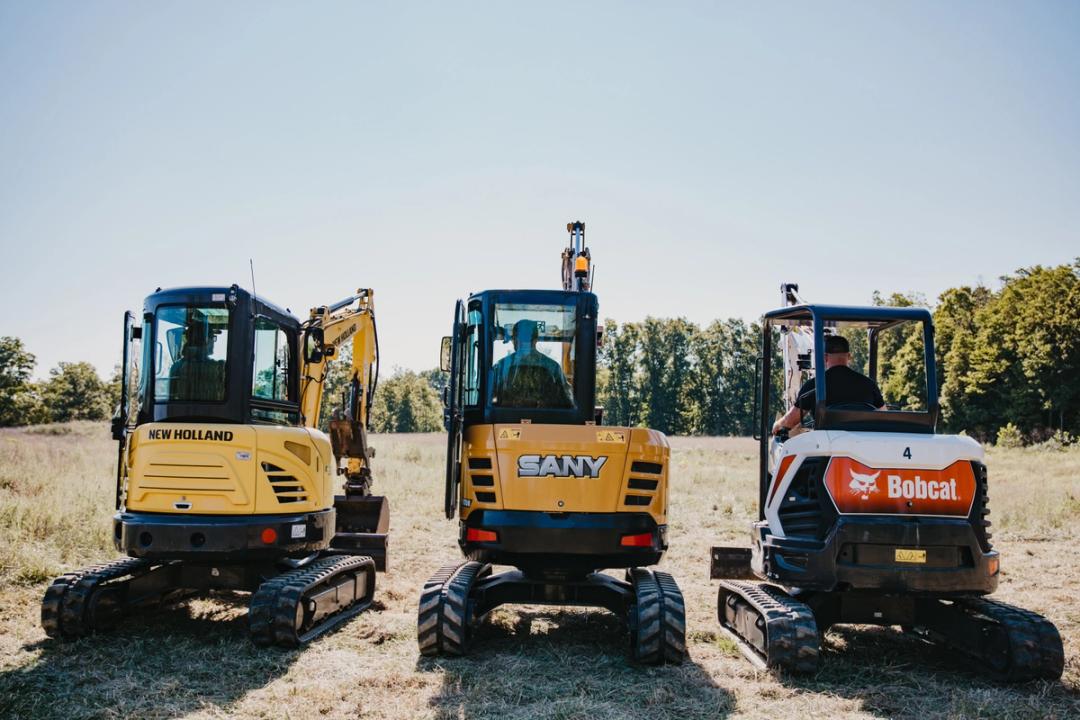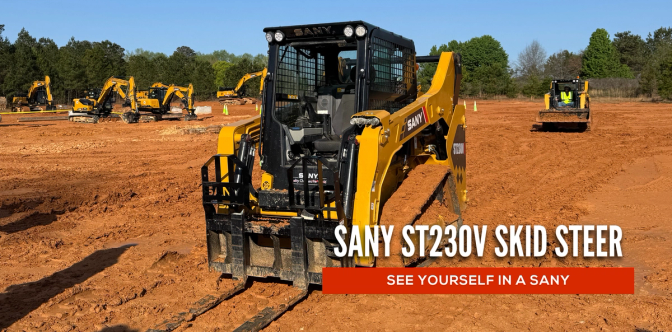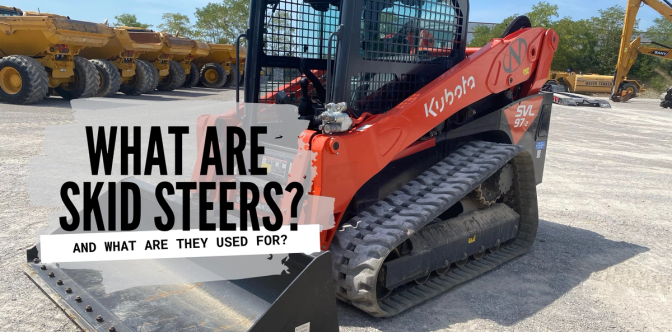Understanding the Importance of Lifetime Value
When comparing the lifetime value of these three options, several factors are crucial:
- One of the primary considerations most people are weighing when purchasing a mini excavator is the initial investment. The upfront cost can vary greatly between different brands, models, and sometimes optional features. While it's tempting to focus solely on getting the cheapest option, it's essential to weigh this cost against the lifetime value of the machine.
- A higher initial investment may be justified if it means superior performance, durability, and lower maintenance costs in the long run. By considering your specific needs and budget, you can make a more informed decision regarding the initial investment.
- Explore different financing options, such as leasing or loans, to make the initial cost more manageable.
- Depending on your situation, your financing institution and your luck, there may be specialized promotions that can help make your initial investment seem even less daunting. Find out what's out there and take advantage of opportunities that might suit your needs with the help of a financial advisor.
- Customization plays a pivotal role in how well a mini excavator aligns with your projects. While many brands have optional features, be sure to know what exactly is included in the baseline package. Weighing the impact on your projects down the line is key to setting yourself up for success.
- Adaptability, allowing you to modify attachments or features to cater to your specific requirements, is a key component to a machine that’s going to grow with you and your business. Planning for this growth in the early stages can save you money in the long run. What attachments and comforts will you want in the next few years? While some machines might come set up, others may not include certain standard features that will limit your versatility.
- When evaluating a mini excavator's lifetime value, think about how easily you can customize the machine to suit your needs now and years from now. A versatile and adaptable unit might prove to be more cost-effective over time, as it can handle a wider range of tasks.
- The ease of maintenance and serviceability is another critical factor to consider. A mini excavator that is simple to service and maintain can save you a good deal of both time and money over the lifetime of your machine. Regular maintenance ensures your machine runs efficiently and extends its operational life.
- Evaluate the accessibility of key components and the availability of replacement parts early on. Machines that are designed with serviceability in mind make routine maintenance more straightforward, keeping your downtime to a minimum. In some cases, these set maintenance schedules are a requirement to upkeep the warranty, and planning for the interruptions will help you know what to expect as you wear in the machine.
- Assess how frequently you'll use the equipment and weigh the cost of rentals against the initial investment of purchasing a demo or previously owned machine. How you plan to utilize the machine is a key factor in deciding just what your initial investment should look like. Whether you and the owner/operator plan to have the machine out with your team on the job site or even rent it out while it’s not in use, it’s critical to plan for the impacts of each as they may impact the choices you make early on.
- The availability of replacement parts is an often overlooked aspect of a mini excavator's lifetime value. Even the most robust machines may require occasional part replacements due to wear and tear. It's essential to choose a brand or model with readily available and reasonably priced parts to minimize operational disruptions and expenses.
- Warranty is a critical factor to consider when assessing the lifetime value of a mini excavator. A comprehensive warranty can provide peace of mind, safeguarding your investment against unexpected repairs or defects. Be sure to review the warranty coverage offered by the manufacturer and consider any extended warranty options.
- Understanding the history of the mini excavator you're considering is vital. It can provide insights into how well the machine has been maintained and whether it has undergone extensive repairs or modifications. A demo machine, a rental unit, or a previously owned unit each comes with a unique history that can impact its lifetime value.
- While previously owned machines can help save you some in the initial investment, depending on how you plan to use the machine it may or may not be right for you. Based on your needs and how you plan to use the machine, factors like cosmetic damage may not be important, but always ensure you are comfortable with what's under the hood in any equipment you're purchasing.
- While new and used machines have different depreciation rates early on, a used machine with multiple owners can affect the resale value of any unit. In the long run, buying a new machine tends to offer higher resale values, which can affect the lifetime value if you plan to sell it in the future.
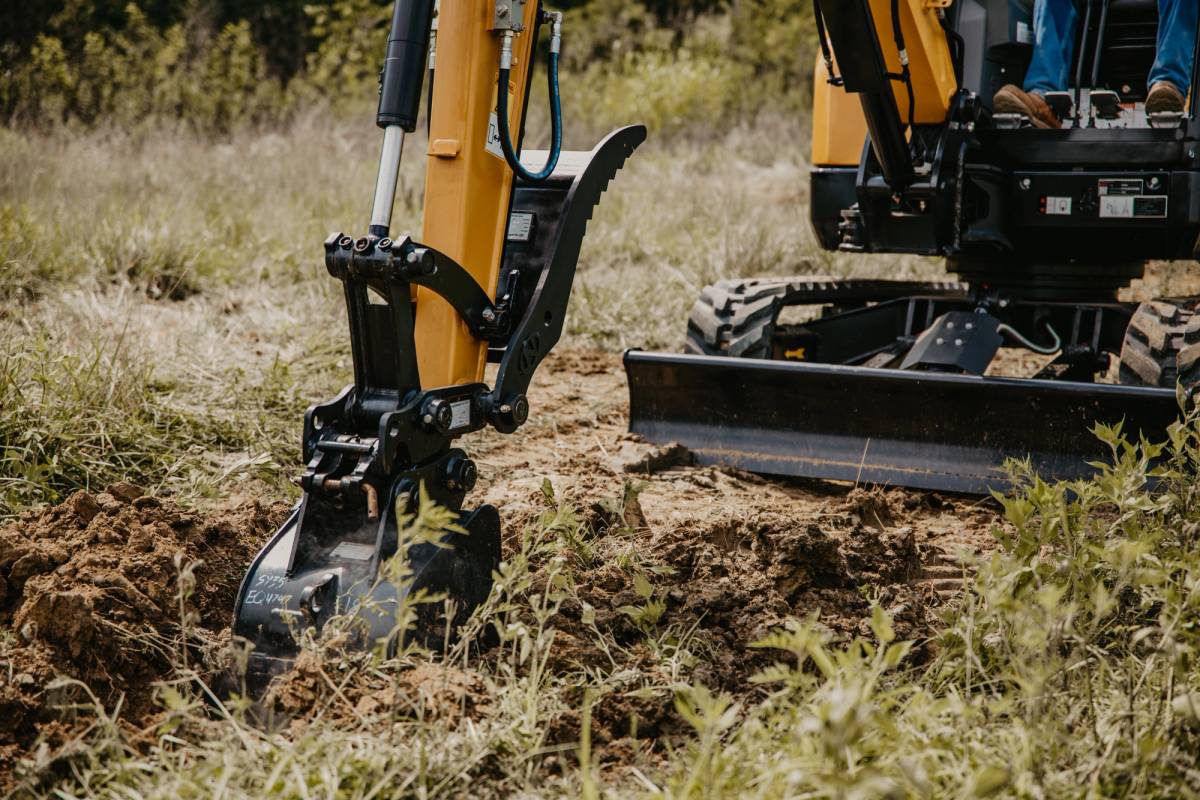
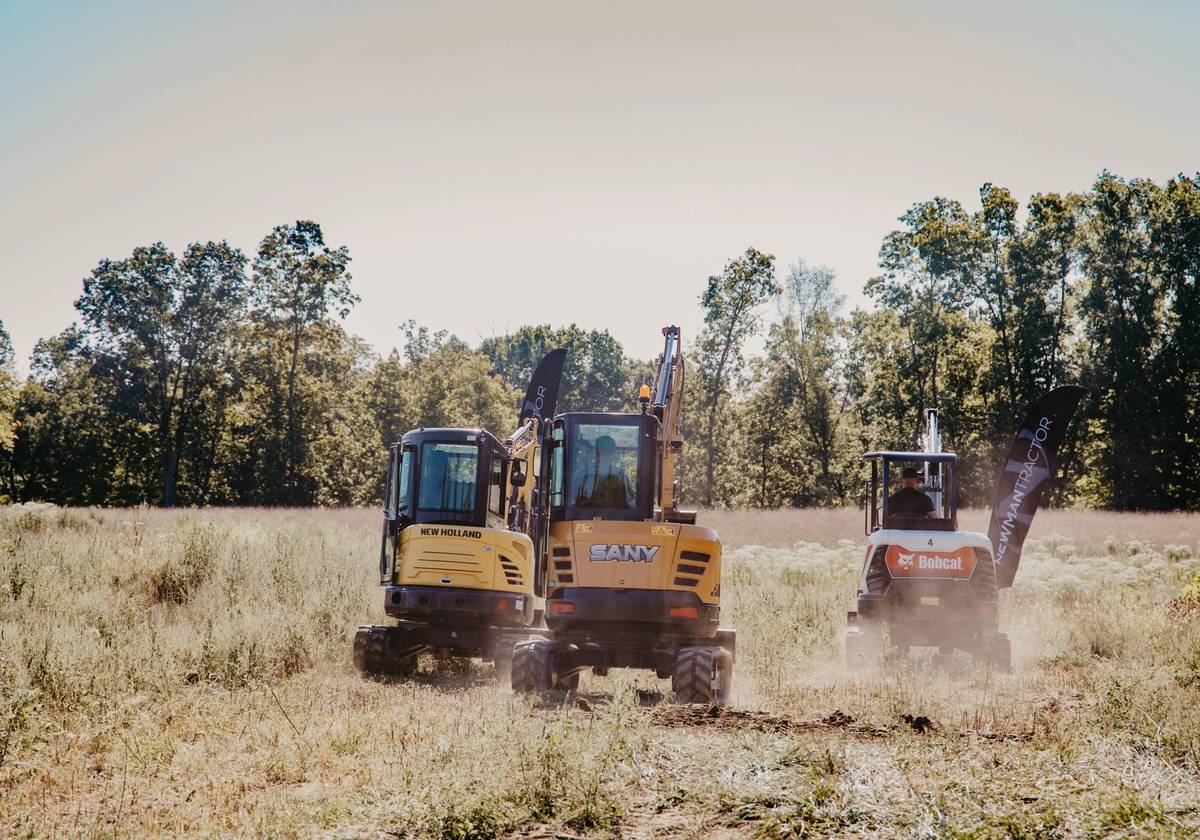
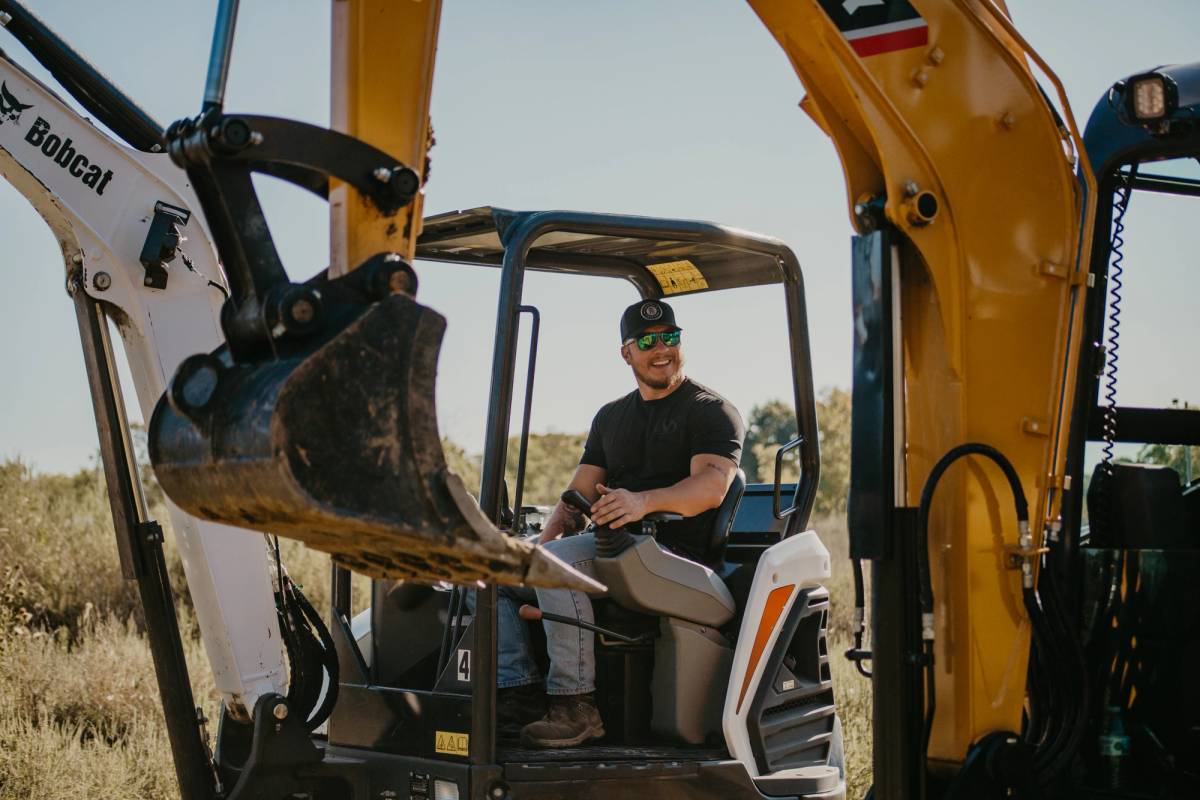
The Excavator Showdown
How These Machines Compare on Paper:
| Specifications | SANY | Bobcat | New Holland |
|---|---|---|---|
| Model | SY35U Canopy | E35 | E37C |
| Operating Weight (LBS) | 8,367 | 7,659 | 8,300 |
| Engine Output (HP) | 23.3 | 24.8 | 24.4 |
| Tail Swing | Zero | Zero | 2'10" |
| Emission Rating | Tier 4f/ EU Stage V Ready | Tier 4 | Tier 4 Final |
| Fuel Tank (Gal) | 10.6 | 13.7 | 10.5 |
| Auxiliary Plumbing | Y | Y | Y |
| Auxiliary Flow (Gal/Min) | 18 | 16.9 | 16 |
| Travel Speed (Mph) | 2.7 | 2.9 | 2.6 |
| Track Shoe Width | 12" | 12.6 | 12" |
| Max Ground Level Reach | 17'11" | 17' | 17'1" / 18' |
| Dig Depth | 10'2" | 10'1" | 10'3" / 11"3" |
| Dump Height | 11'4" | 11'5" | 11'3" / 11'10" |
| A/C Heat | Y / - | Optional | Optional |
| Open Rop or Closed | Both | Optional | Both |
| Bucket Breakout Force (Lbf) | 6,385 | 7,284 | 6,900 |
| Warranty | 5-year / 5000 hr | 2-year / 2000 hr | Base 2-year / 3,000 hr Full machine Limited Warranty |
Choosing the Right Machine
- Cost: Demo machines are generally more affordable than brand-new equipment, making the SANY SY35U an attractive option. It allows you to benefit from the latest technology at a reduced price along with a transferable warranty.
- Maintenance: With only 250 hours on the clock, this machine is relatively new and should require minimal maintenance. This translates into lower operational costs over time. Generally speaking, a demo unit is well maintained in-house by trained technicians. This means your machine comes with all the required and recommended service intervals with documentation in hand for your warranty needs.
- Customization: While a demo machine may not be tailored to your specific needs, it still offers a high level of versatility and can be adapted for various tasks. Additionally, if you are purchasing a SANY demo machine, a large variety of typical machine “upgrades” are already installed on the machine with SANY’s dedication to “fully loaded”. Each unit comes standard with LED lights, AC / Heat in closed cab models, a 2-way blade, and pre-plumbed hydraulic for your attachments. Depending on which model you need, these specs will be tailored to the performance features known best to that class size.
- Cost: The initial acquisition cost is lower than that of a new unit, however, you have to take into consideration the fact that a machine used by multiple operators over time may require some initial maintenance. With varying histories, each machine should be individually and carefully evaluated.
- Maintenance: Rental machines are typically well-maintained, but with 400 hours of use, maintenance needs may arise. Ensure you're aware of the maintenance history and budget for ongoing upkeep.
- Customization: Rental machines may not be customized for your specific requirements, limiting their adaptability for unique projects unless you purchase a unit that is already prefabricated to your specifications or comes fully loaded like the SANY product line-up. Depending on where your machine is purchased from, you may have the option to add or alter the setup of the machine. Instances like this, often from a dealership with a rental fleet of its own, would come with additional costs.
- Cost: While previously owned machines are more affordable than brand-new ones, they are generally pricier than demo or rental machines. The extra cost can be attributed to their higher initial price, hours, history, and potential customization depending on whether you are purchasing directly from an independent owner or from a dealership.
- Maintenance: The condition of the previously owned machine will vary, and maintenance costs may be required to bring it up to your standards. However, you have control over the maintenance and can ensure it suits your needs. Check if your machine has transferable warranty coverage left and if that’s important to you, be sure you know it's been well-documented to prevent any potential bumps down the road.
- Customization: Previously owned machines can come in a variety of setups, which can be a significant advantage for specific projects. Some may be tailored to fit your needs already, some set up for future customization, and others with the bare bones package. Be sure to keep a look out for the attachments you need and the compatibility when searching for a previously owned machine.
